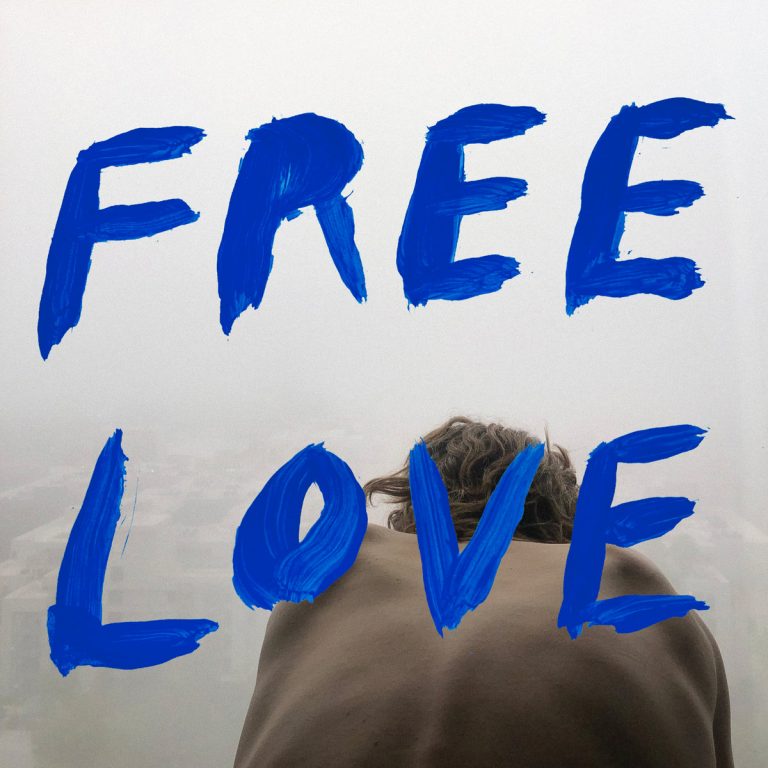The first thing you hear on Free Love, the new album from electronic pop duo Sylvan Esso, is a stuttering tone. It’s almost like the aural equivalent of a puff of air; a gentle glitch with some soft, cycling notes. Soon after, Amelia Meath’s voice comes in, double tracked with a robotic twin, wondering esoteric things like “What if end was begin? / Then would men be like mothers?” These questions continue to play out over the song’s brief 86-second run time, while the sound behind them slowly grows in intensity, before peaking in a noisy climax. Then it cuts away again, with Meath simply intoning: “Open wide / She’s coming out.”
The “she” in that final line could be anything, but it serves as a perfect introduction to the band’s third album. Free Love is coming, and Meath and bandmate Nick Sanborn are asking that you open wide and prepare. It’s not surprising, perhaps, that the band chooses to open this record with such a quiet piece – it’s something they’ve done before. On their debut, “Hey Mami” opened with samples of street noise and Meath’s growing harmonies, a cappella. On their Grammy-nominated follow up What Now, “Sound” greets us with a spellbinding mix of glitchy synths and Meath’s obscured vocals, volume ticking up and down, like some faded radio transmission. These quiet first steps are nothing new for the band, but what is new is the fact that, for much of Free Love, the temperature doesn’t rise all that much, mostly existing in a relatively cool and spare space.
Sylvan Esso have made quiet songs before; What Now had the deeply pretty “Slack-Jaw” and the laid back grooves of “Rewind”, but on their third album they seem to be indulging more than ever in their particular fascination with open space and minimalism. In fact, the only track in their back catalog that seems to properly prepare you for Free Love is “Kick Jump Twist”, whose supremely minimalistic instrumental palette is a clear forebear to this album’s lowkey vibes.
This shouldn’t be much of a surprise when you consider the pre-album singles. “Rooftop Dancing” gets by on little more than spare acoustic guitar, snippets of children playing, and chopped-up samples of Meath’s singing. “Frequency” finds Meath singing atop what sounds like a chopped-and-screwed sample of room tone. Even “Ferris Wheel”, which is the biggest, catchiest pop song here, and the closest the band comes to a banger on Free Love, is relatively tame compared to past singles like “Radio” and “Play it Right”.
Sanborn said that he was inspired after their WITH tour (which saw them performing some more organic versions of their songs alongside a full band) to go smaller, and to remind himself that whatever he and Meath made together, it would be a Sylvan Esso project no matter what. And in fact, this is the smallest the duo has ever sounded; the most like a duo they’ve ever been on record.
“Free” shows us Meath singing over very simple piano and some soft washes of synth. “Train” has an extremely simple 4/4 beat (as several songs do here) accompanied by some spare squawks. The closing “Make it Easy” uses a similar trick to “Frequency”, in that the main instrument seems to be manipulated room tone or static, before it blooms into yet another shimmering climax. And speaking of “Frequency”, the catchy melodies on its chorus are the closest the band has ever come to Meath’s folk origins in the group Mountain Man; its lovely and bouncy harmonies would be right at home in one of their songs.
Much of the excitement comes in little details here and there, like how the reverb blossoms oh-so-gently on the chorus of “Free”, or the way the acoustic guitar figures into the back end of “Runaway”, or the various vocal manipulations and samples they employ throughout. The most successful song on the album, “Rooftop Dancing”, feels like the perfect distillation of this new sound, with a laid-back groove that is almost suggested rather than provided. These details are key to unlocking Free Love’s charms, but small details are not always enough to make a wholly satisfying experience, especially when some of the album is simply played too safe, and the lyrics — for all their straightforwardness — frequently leave a bit to be desired.
In giving us such a sparse album, Sylvan Esso have mostly abandoned the big pop jams that used to be their calling card, and returned a quiet, reflective collection. It’s also their shortest record, at under 30 minutes, floating by like two cool people making 10 cool songs for 28 minutes, and not much more. Free Love is almost like pop music in miniature: scale models of summer jams, almost as if the duo wrote them from inside a particularly chill music box. In doing this, the songs don’t have as much power as they once did, even though Meath and Sanborn clearly feel very comfortable in this style — with his beats and soundscapes always attenuate but mobile, and her voice as effortlessly elastic and beautiful as ever. It’s sometimes refreshing to hear them lean into their minimalist instincts a little more this time around, but often there’s just a bit of weight missing from the bones.

